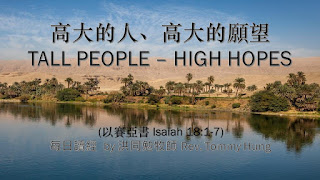讀經: 以賽亞書 十九1~15
SCRIPTURE
READING: Isaiah 19:1-15
釋義: 埃及在舊約許多時候代表敵對神的勢力, 而以賽亞那時猶大企圖與她結盟來抵抗亞述的侵略。但是耶和華警告猶大人切勿投靠埃及,
因為耶和華要「乘駕快雲」威風凜凜地臨到埃及, 施行審判毀壞(1)。
In the Old Testament, Egypt often represents
forces that oppose God; and during the time of Isaiah, Judah attempted to make
an alliance with her to resist Assyrian’s invasion. But the Lord warns Judah against seeking
protection from Egypt; because the Lord will ride on a swift cloud, descend to
Egypt majestically to execute judgment and destruction (1).
接著講論神攻擊埃及的五個要點:
The prophet then continues to talk about the 5
key points regarding the attack of Egypt by God:
自私無情-- 2節五次提到「攻擊」,這固然披露埃及的凶殘行為, 但這些是彼此攻擊, 更先是兄弟相殘, 然後是鄰舍、城市、國家。說明他們廝殺, 不是爭權奪利, 乃嗜殺成性, 不顧親情,
雖是同根生, 仍急相煎。
SELFISH AND RUTHLESS – Verse 2 mentions “(fight) against” 5 times,
which certainly reveals Egypt’s brutality; but these are Egyptians against
Egyptians, starting with brothers, then neighbors, cities, and kingdoms. It shows that they slaughter not to gain power
or money, but to satisfy their appetite to kill, with no regard for their
kinship. Despite coming from the same
root, they are eager to destroy each other.
錯謬信仰-- 當耶和華擊打他們時, 「埃及人的心神必在裡面耗盡」, 他們的對策就是: 「求問偶像和念咒的、交鬼的、行巫術的。」(3)
ERRONEOUS FAITH – When the Lord attacks them, “the spirit of the Egyptians within
them will be emptied out”, their counter-strategy is to “inquire of the idols
and the sorcerers, and the mediums and the necromancers” (3).
強暴政權 -- 學者對4節的「殘忍主、強暴王」是誰持不同意見。他可能是亞述王(廿4): 主前670年亞述王以撒哈頓征服過埃及。也有人認為是後來統一國家的森美忒庫法老王(主前663至609年)、以苛刻手段對待百姓。
強暴政權 -- 學者對4節的「殘忍主、強暴王」是誰持不同意見。他可能是亞述王(廿4): 主前670年亞述王以撒哈頓征服過埃及。也有人認為是後來統一國家的森美忒庫法老王(主前663至609年)、以苛刻手段對待百姓。
FIERCE POLITICAL REGIME – Regarding who the “hard master, and a fierce
king” is in verse 4, scholars hold different opinions. Some think he could be the Assyrian king
(20:4): Assyrian king Esarhaddon had
conquered Egypt in 670 BC. Others think
he is Pharaoh Psammetichus I (663 – 609 BC) who unified the kingdom and treated
his people harshly.
河旱打擊 --
5-10節預言尼羅河乾涸。埃及赤道的位置, 加上沙漠的地理環境,
尼羅河穩定的水源可以說是他們的命脈。河水減少枯乾 (5-6)的打擊實在致命:
農作物「衰殘、枯乾、歸於無有」;人則「悲傷、衰弱、羞愧、愁煩」。
STRUCK BY DROUGHT – Verse 5 – 10 prophesies the drying up of the
Nile. With Egypt on the equator and her
dessert geographical environment, the steady water supply from the Nile is her
lifeline. The blow from a dried and
parched river is essentially fatal – Crops “rot away, parched, and be no more’;
people “mourn, languish, in despair, and grieve”.
愚頑不靈 -- 埃及祭司以智慧稱著, 不少法老王出自祭司派系; 這裡提到的智者兼有智慧的傳統和王室的血統。事實上埃及產生了一些當時近東最優秀文學家與政治家,有些甚至影響了以色列的文化(例箴廿二17-廿四22清楚表明借用了埃及的形式)
。但是先知稱呼這些智慧人「極其愚昧」,因為他們不知道神的旨意。(12)
FOOLISH AND STUBBORN – Egyptian priests are famous for their wisdom;
many pharaohs came from the line of priests. The wise men mentioned here possess both the
tradition of wisdom and royal blood. Egypt
indeed produced some of the best writers and politicians in the Near East at
that time; some even had influence over the Israelite culture (example,
Proverbs 22:17 – 24:22 clearly show the adoption of Egyptian style). Yet the prophet calls these wise men “utterly
foolish”; because they do not know God’s will (12).
華倫本尼斯和伯特‧納斯合作撰寫《領導人物》(Leaders)一書時, 訪問了不少最高層領導人物。這些領導人在性格方面和一般人顯著不同。兩位作者說: 「他們不會想到失敗。他們甚至不用這點詞,
必要時就用毛病、差錯、錯誤、困境之類的字眼來代替, 但從不說失敗。」
When Warren Bennis and Burt Nanus
co-authored the book “Leaders”, they interviewed many top leaders. The
personalities of these leaders are notably different from those of ordinary
people. The two authors said, ‘They simply don't think about failure,
don't even use the word, relying on such synonyms as "mistake",
"glitch", "bungle", or countless others, but never
“failure”.’
這種說法可能具勵志性, 卻是掩耳盜鈴。基督徒不怕承認失敗, 因為得救的經歷告訴我們, 基督徒是在主裡得勝的失敗者。現在就請你向神承認失敗,
求祂再次腸恩, 使你得勝。
This way of thinking may be inspirational, but it
is an ‘ostrich mentality’. Christians
are not afraid to fail because the salvation experience tells us that
Christians are people who have overcome their failures through Christ. Take a moment to confess your failures to God
and ask Him to once again shed His grace upon, so that you could be victorious.
每日讀經 by 洪同勉牧師 Rev. Tommy Hung




